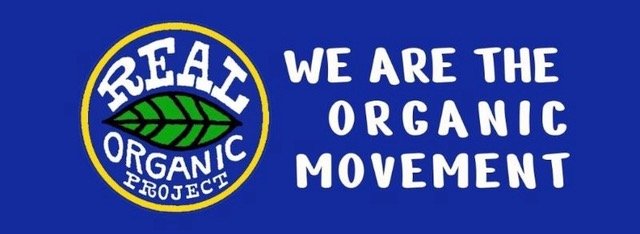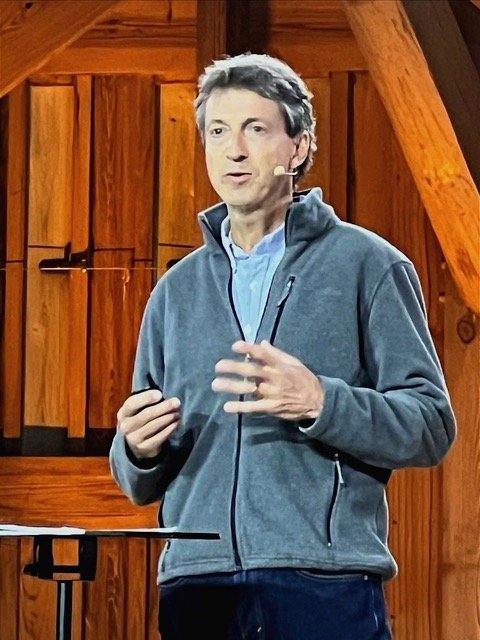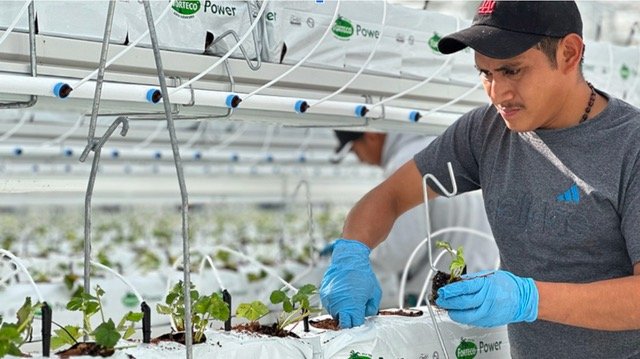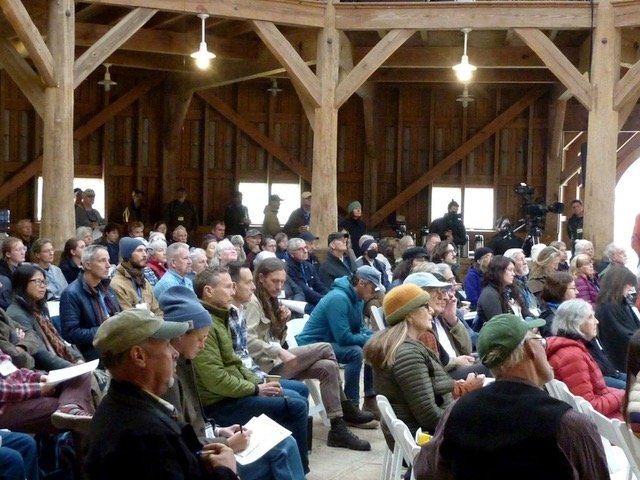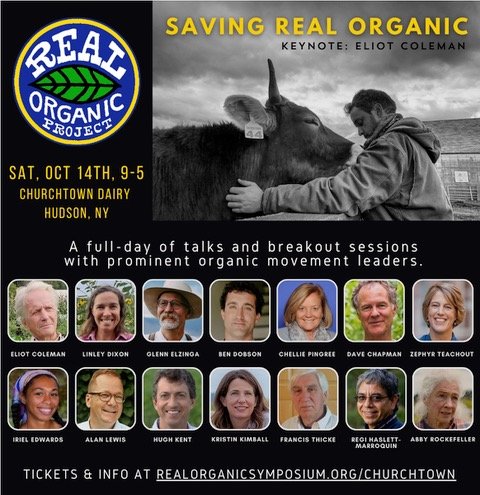We are the Organic Movement…
"I wish I had a better message, but I'd like to report to the choir that our church is on fire. Last time I spoke for the Real Organic Project at Dartmouth I reported about organic blueberries as a sick Canary in the coal mine of our corrupted food system. And now almost 5 years later, in the southeastern United States, it's a dead canary. There are many other sick and dying canaries that we will tell you about. It's very difficult to find truly organic soil-grown tomatoes, blueberries, peppers, cucumbers, greens, and herbs. And the list is growing. From my perspective, I see the United States Department of Agriculture as the perpetrator. They're not an Arbiter of competing interests. They're the perpetrator of the situation that we're in."
—Hugh Kent speaking at the "Saving Real Organic" conference
We are recovering a week after the Churchtown conference called "Saving Real Organic." Months of work to prepare for a gathering of our community.
It was… something else.
Tremendous talks were given by farmers I deeply respect. And the pieces of a complicated puzzle came together.
A journalist once asked Paul Hawken if he would sum up his last book in a few sentences. He replied that if he could do that he wouldn’t have needed to write the book. We can’t easily turn our mission into an elevator pitch. We need to go deeper.
And, going deeper, we need to think bigger.
So each speaker brought their stories to the group, and when they were done, a wholeness was revealed. It was not all that needed to be said to be understood, but it was a start.
We will release the talks in the coming months as podcasts/YouTube videos. It won’t be the same as being in the room, exchanging ideas. Together. But it will be something.
For me, the conference was addressing the challenge that we must think bigger. The Real Organic Project started by fighting for reform of a few very important government standards. It has evolved into building a movement to create a new food system.
No movement, no new food system.
Yes, that is way too big, but we must try.
Yesterday, I testified to the National Organic Standards Board. It was virtual, and there were about 120 people listening to each other. They represented the heroes and villains of the organic brand. The vice-president of a Canadian hydro company testified that we should abandon the 3-year transition for hydroponic production because, after all, what was the point if you aren’t growing in the ground? He had a good point, if you leave out the law and the meaning of organic. He managed to tell lie after lie in only three minutes. It was pretty impressive. He even insisted that the coconut husks that his company grew berries in were “soil.” He included Grodan in his definition of soil. Grodan is rockwool, another “substrate” used in hydroponic production. Kind of like fiberglass insulation. Soil, coco coir, rockwool…What’s the difference?
Well.
I’m not even sure he knew he was lying. He knew nothing about organic. He had never read Howard or Balfour, Carson or Coleman. Kirschenmann or Berry. He was just a hired gun working to exploit a new market, and he proudly told us about the 45 acres of hydroponic strawberries grown under glass that his company was selling as organic.
45 acres of hydroponic strawberries grown in Canada.
So there it is. His company works with three lobbying organizations. Organic Trade Association, Organic Produce Association, and Coalition For Sustainable Organics. Those groups represent many billions of dollars in production being certified as organic. They work tirelessly to subvert the laws protecting organic. They talk to the USDA. They have testified to Congress. They have much bigger microphones than any of us, and they won’t be stopped.
So what do we do?
My answer is that we rebuild our organic movement. We will call it Real Organic. We were named by a hydroponic friend who was visiting to learn more about organic. His hydro company was considering putting in a “certified organic” block of peppers. I reminded him that I did not agree with calling that organic. He said, “I have no choice. This is where the market is pushing us. Of course, David. You are REAL organic.” He said it as an apology for his invasion of the organic market. He is a good person. He wasn’t breaking the law, at least as it is interpreted by the USDA.
In my talk at Churchtown, I once again quoted Vincent Stanley: “A sense of agency is more important than optimism.” I listed 6 true things that can guide us to our sense of agency.
We are limited by our fear.
If we aren’t confused, we aren’t paying attention.
No one is coming to save us.
We do not need anyone’s permission to act.
The hour is late. Time is short. We need to act now!
We did it before and we can do it again.
We need an organic movement. So please, join us in spreading the word.
Dave
A packed crowd filled the majestic round barn.
A packed crowd filled the majestic round barn.
"The word agriculture means the care of the land, care of the farm, the care of the soil. 'Agri' is 'field' and 'culture' is the Latin word for 'care of'. So 'care of the soil' is the key and care of the soil is what organic is about.
“Big Ag, or what I call Corp Ag; they know whereof they speak when they refer to themselves as “Ag,” because they have no “culture.” They don’t care for the soi. They mine the soil. And that is the key difference.
“I invited Real Organic because they are setting out to protect, yet again, the idea of organic.”
– Abby Rockefeller opening the "Saving Real Organic" conference
“When I started as an organic grower 50 years ago, organic was a way of thinking rather than a profit center. It became a profit center. It was taken over by all those people. My delight in the intricacies of the natural world, my adventure into an ever deeper appreciation of the soil, plant, animal, nutrition cycle, and how to optimize it, is not acceptable to the homogenized mentality of mass marketing.”
– Eliot Coleman at the Real Organic Churchtown Dairy conference. (First written in 2002.)
"Seth Godin, who is a fan of Real Organic, said, 'A project begins with a protest that ends with: 'We'll be back tomorrow, and we're bringing our friends.'
"And it turns out we have a lot of friends. And that's what the Real Organic Project is."
– Linley Dixon, Co-Director of Real Organic Project
"Don’t be fooled by the word the USDA is using increasingly in all of their promotional material. Integrity. Integrity. You see integrity everywhere across the USDA’s website. It’s become a new favorite word. It’s often in capitals. And what does integrity mean? Of course, it’s the alignment of belief, and communication, and action. It is alignment of what you believe, what you say, what you do. And in an institutional setting, a governmental setting, that would mean for the USDA, what they 'believe' would be the enabling statutes, the National Organic Program, the OFPA; what established organics in this country. That’s what they believe. And what theycommunicate is the kind of thing that you see on their websites; their mission statements. 'Ensure the integrity throughout the world.' I think what we have to do is look at their actions. An individual or an institution isn’t trustworthy if they don’t walk the talk.
"You may say you believe this. You may communicate it. But what are your actions?"
—Hugh Kent at Churchtown
"I invite Real Organic Project and all farmers and communities to not just consider the diversity of our landscapes but the diversity of our movements and how that is very much a measure of success."
– Iriel Edwards from the Real Organic certification team on race in agriculture.
“We’re here today with Real Organic Project because, while I’m a bit snarky, the real truth is we need to make an alliance between good science, good policy, good food, and health.
“And in order to do that, I would say we need to hold the USDA accountable to standards and to IMPROVED standards. We also have to work outside of them until we can get the right people inside.”
—Ben Dobson at Churchtown Dairy.
“I don’t like fighting. I would rather be building the stuff that we want. Coming together like this and NOT giving an inch. That really is how we are going to get there. So we need a Real Regenerative movement. We need a Real Organic movement. We need a REAL Food movement. Like a Real Dairy Barn national movement. We need everything REAL again. Let’s make America REAL again.”
– Reginaldo Haslett-Marroquin at Churchtown Dairy
In Zephyr’s book, she had a really interesting description of the activism of Henry David Thoreau and Martin Luther King. They both practiced civil disobedience, but they had a somewhat different intention. For Thoreau, it was really about living a public life that was in alignment with his inner life, and making sure there was integrity there. And for King, it was all of that, but it was also about taking actions that would further a cause of transformation. So he was seeking a public transformation, not just a personal transformation. I think that’s an important difference. The Real Organic Project, you know, all of the farmers could have taken the Thoreauvian path, and said, 'I'm going to take the life I believe in. And I hope that it benefits the world.' But we actually are an attempt to organize ourselves and see if we can change a greater reality."
—Dave Chapman at Churchtown Dairy
"Let's not forget that when the system broke down during COVID, when the folks in Peru, in India, and Mexico either couldn't make the food that we buy or decided to keep it for themselves. People in the city drove out to your farmgate and said, 'Hey feed us. Make us healthy.' They drove out to you and asked for what you produced because they know intuitively, innately, inherently that what they're buying from the supermarket is sketchy, and ultimately the real value in food and agriculture is the community that resides in the lands around them."
– Alan Lewis, Natural Grocers
"Our merger policy, enabling this, in the last 10 years, 500,000 global mergers. I mean, you feel the earth shake under your feet, or we should! At how radical this was, to restructure our economy. We’re talking about politics as if it’s happening on the political page, but when Dow marries DuPont, Shakespeare would be more focused on THAT than on politics. Because that’s the big restructuring of politics. When Bayer and Monsanto merge, that is one of the most important, grotesque marriages in our global political system. And this happens in the business pages where people feel too intimidated to get involved. So this radical, total revolution has then led to a system of radical disempowerment.
"And to be here today to see what the alternative could look like, CAN look like, is so exciting because it is so human and complex and complete. It is not monoculture top-down. It IS a vision of freedom. And I’m blown away with what you’ve been able to accomplish in the last 5 years. But we’ve got a long way to go."
—Zephyr Teachout at Churchtown Dairy
"Food scientists and ad executives get really big fat paychecks to make you think it tastes good, but the truth is it’s bad for us. It’s bad for our communities. It’s bad for our planet. And if you pause to REALLY taste it, you realize that it offers you nothing except a quick dopamine hit from the carefully calibrated levels of salt and fat and sugar and flavor.
“These are simulations for real foods. In the same way that screens are simulations of real experience. And while they can be gratifying and distracting and addictive, they’re never really satisfying.”
—Kristin Kimball at Churchtown
“The cattle are ‘slick’. It means there’s no aberrations on their hides. There’s no bugs. There’s no flies on ‘em. We use no fly control. We’re organic, right? It’s because of the phytochemical richness. Dr. Fred Provenza was out there with me. I said, “Fred, why no bugs?!!’ And he said, ‘Because they’re eating their own medicine. They’re eating it, and it’s coming through their hair. And the flies don’t like it. You’re letting a cow be a cow. You’re letting them make their own nutritional wisdom. It’s not a feedlot. You’re not feeding 'em corn. You’re feeding them 2500 plants.’”
—Glenn Elzinga at Churchtown Dairy
"Now organic is becoming a multibillion-dollar industry around the turn of the century. So now the food industry’s looking at it and saying, ‘Hey, that’s the fastest growing section of food. We’ve got to get part of that pie.'
"Actually they want the whole pie."
—Francis Thicke at the Churchtown Conference
******Get a ticket to the recordings of the Churchtown Dairy conference: Saving Real Organic
To hear more from our friends at Real Organic Project, sign up for their weekly newsletter here.

